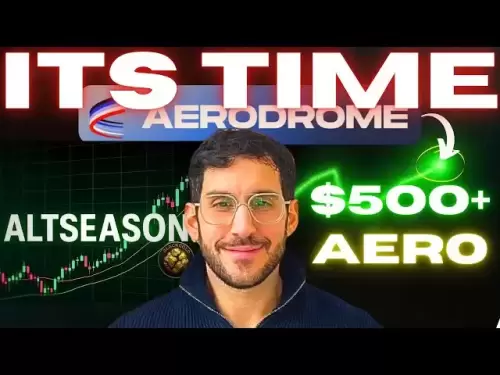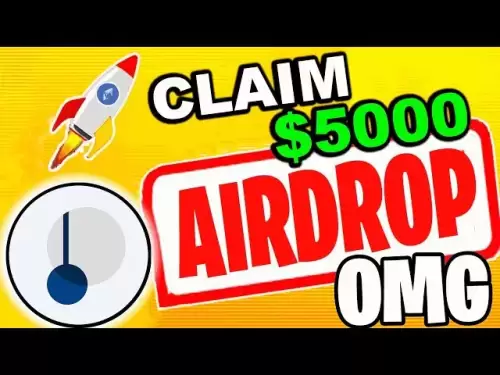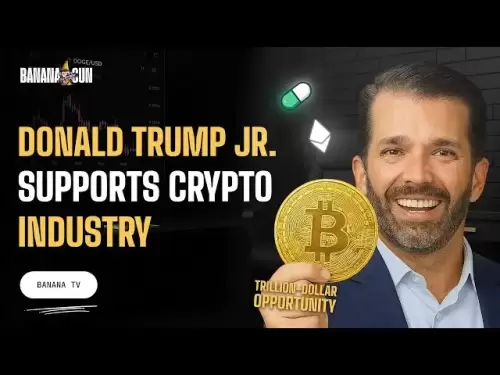-
 Bitcoin
Bitcoin $118100
0.28% -
 Ethereum
Ethereum $3565
-0.39% -
 XRP
XRP $3.434
0.06% -
 Tether USDt
Tether USDt $1.000
0.00% -
 BNB
BNB $732.7
-1.24% -
 Solana
Solana $177.8
-0.46% -
 USDC
USDC $0.9998
0.00% -
 Dogecoin
Dogecoin $0.2435
2.87% -
 TRON
TRON $0.3189
-2.47% -
 Cardano
Cardano $0.8262
-0.47% -
 Hyperliquid
Hyperliquid $44.98
1.44% -
 Stellar
Stellar $0.4642
-1.36% -
 Sui
Sui $3.787
-2.64% -
 Chainlink
Chainlink $18.12
0.40% -
 Hedera
Hedera $0.2697
0.62% -
 Avalanche
Avalanche $23.86
-0.29% -
 Bitcoin Cash
Bitcoin Cash $505.5
-2.16% -
 Shiba Inu
Shiba Inu $0.00001473
-0.73% -
 UNUS SED LEO
UNUS SED LEO $8.982
0.16% -
 Toncoin
Toncoin $3.174
-3.45% -
 Litecoin
Litecoin $101.8
-3.26% -
 Polkadot
Polkadot $4.268
-1.77% -
 Uniswap
Uniswap $10.16
-1.13% -
 Monero
Monero $327.1
-0.06% -
 Ethena USDe
Ethena USDe $1.001
-0.02% -
 Bitget Token
Bitget Token $4.888
-0.98% -
 Pepe
Pepe $0.00001317
-1.85% -
 Dai
Dai $0.9999
-0.01% -
 Aave
Aave $317.8
-0.66% -
 Bittensor
Bittensor $416.8
1.45%
What blockchain are NFTs on?
Blockchain technology underpins NFTs, ensuring authenticity and ownership through decentralized ledgers.
Jul 13, 2025 at 09:29 pm
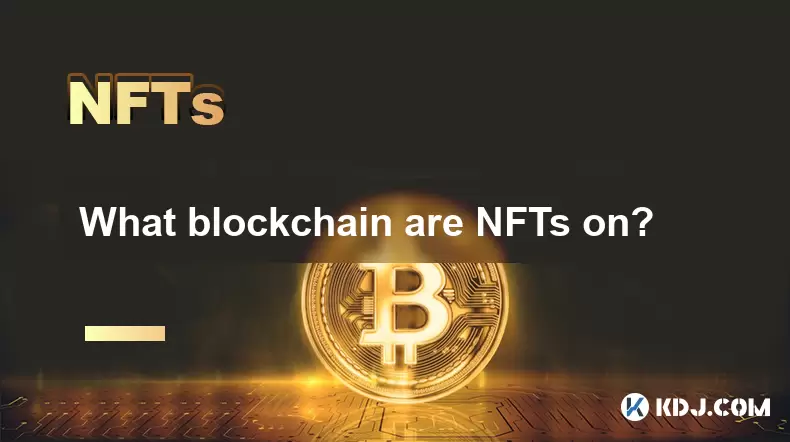
Understanding the Role of Blockchain in NFTs
Non-Fungible Tokens (NFTs) have become a significant part of the digital economy, largely due to their reliance on blockchain technology. The core concept behind NFTs is that they represent unique digital assets verified through blockchain, ensuring authenticity and ownership. Unlike traditional digital files, which can be copied infinitely, NFTs use blockchain ledgers to create scarcity and provenance, making them valuable.
Blockchain serves as the foundation for NFTs by providing a decentralized, tamper-proof record of transactions. Each NFT is stored on a blockchain network, which records details such as the owner, creation date, and transaction history. This ensures transparency and eliminates fraud or duplication.
Ethereum: The Leading Blockchain for NFTs
The Ethereum blockchain has been the most widely used platform for NFTs since their inception. Ethereum introduced the ERC-721 standard, which became the blueprint for creating non-fungible tokens. It allows developers to build smart contracts that manage the minting, transfer, and ownership verification of NFTs.
One of the key reasons why Ethereum remains dominant in the NFT space is its mature ecosystem. Developers benefit from established tools, marketplaces like OpenSea and Rarible, and a large user base familiar with Ethereum-based wallets such as MetaMask. Additionally, the introduction of ERC-1155, a semi-fungible token standard, has expanded capabilities for creators.
However, Ethereum's high gas fees and scalability issues have prompted exploration into alternative blockchains. Despite these challenges, it continues to host the majority of NFT collections and offers robust security due to its extensive decentralization.
Alternative Blockchains Supporting NFTs
While Ethereum leads the NFT market, several other blockchain networks support NFT creation and trading. These include Binance Smart Chain (BSC), Solana, Cardano, Tezos, and Polygon. Each of these platforms offers distinct advantages and trade-offs compared to Ethereum.
For instance, Binance Smart Chain provides lower transaction fees, making it attractive for artists and collectors who want to minimize costs. Solana emphasizes fast transaction speeds, enabling near-instantaneous NFT transfers. Tezos focuses on energy efficiency, appealing to environmentally conscious creators. Polygon serves as a layer-2 solution for Ethereum, offering scalability while maintaining compatibility with the Ethereum mainnet.
Each of these blockchains supports NFT standards similar to Ethereum’s ERC-721 and ERC-1155. For example, BSC uses BEP-7 and BEP-11, while Solana has its own token program framework for NFTs.
How to Choose the Right Blockchain for Your NFT Project
Selecting the appropriate blockchain for an NFT project depends on various factors including cost, speed, environmental impact, and community adoption. Creators should evaluate these aspects based on their specific goals and target audience.
If security and widespread recognition are priorities, Ethereum remains the best choice despite higher fees. However, if cost-efficiency and faster transactions are more critical, BSC or Solana might be preferable. For projects aiming to maintain environmental sustainability, Tezos or Algorand offer excellent options.
Creators must also consider marketplace availability on each blockchain. While platforms like OpenSea primarily support Ethereum-based NFTs, others such as BakerySwap (for BSC) or Solanart (for Solana) cater to their respective ecosystems. Choosing a blockchain with active marketplaces increases visibility and liquidity.
Additionally, wallet compatibility plays a crucial role. Most NFTs require users to interact via compatible wallets like MetaMask, Trust Wallet, or Phantom. Ensuring that your chosen blockchain integrates smoothly with popular wallets enhances accessibility for buyers and sellers.
Minting an NFT on Different Blockchains: A Step-by-Step Guide
To mint an NFT on any blockchain, you’ll need to follow several steps tailored to the specific network. Below is a general guide applicable across multiple platforms:
- Choose a blockchain that aligns with your needs (e.g., Ethereum, BSC, Solana).
- Set up a compatible wallet—MetaMask for Ethereum/BSC, Phantom for Solana.
- Fund your wallet with the native cryptocurrency (ETH, BNB, SOL) to pay for gas or transaction fees.
- Connect your wallet to a marketplace that supports your chosen blockchain.
- Upload your digital file (image, video, audio) and fill in metadata such as name, description, and properties.
- Mint the NFT by confirming the transaction and paying the associated fee.
- List the NFT for sale once minting completes successfully.
Some platforms allow gas-free minting, especially on blockchains like Flow or Immutable X, where creators don’t pay upfront fees until the item sells. This model lowers entry barriers for new artists.
Frequently Asked Questions About NFT Blockchains
Q: Can I move my NFT from one blockchain to another?
A: NFTs are generally non-transferable between blockchains due to differences in protocols and standards. However, cross-chain bridges may enable limited interoperability, though they carry risks and are not universally supported.
Q: Why do some NFTs cost more to mint than others?
A: Minting costs depend on network congestion, gas fees, and blockchain efficiency. Ethereum often has higher fees during peak times, while blockchains like Solana or Tezos offer cheaper alternatives.
Q: Are all NFTs on Ethereum considered superior?
A: Not necessarily. While Ethereum offers greater adoption and security, other blockchains provide benefits like lower fees or eco-friendly consensus mechanisms, making them suitable depending on individual needs.
Q: How do I know which blockchain my NFT is on?
A: You can check your NFT’s details on a blockchain explorer like Etherscan (Ethereum), BscScan (BSC), or Solscan (Solana). Look for the contract address and transaction history to identify the underlying blockchain.
Disclaimer:info@kdj.com
The information provided is not trading advice. kdj.com does not assume any responsibility for any investments made based on the information provided in this article. Cryptocurrencies are highly volatile and it is highly recommended that you invest with caution after thorough research!
If you believe that the content used on this website infringes your copyright, please contact us immediately (info@kdj.com) and we will delete it promptly.
- XRP Mining for Passive Wealth: Is It the 2025 Crypto Gold Rush?
- 2025-07-19 22:50:12
- Aptos Price Analysis: Bullish Momentum Building?
- 2025-07-19 23:30:12
- Bitcoin, XRP, XYZVerse: Crypto's Highs, Community Dreams, and Meme Coin Mania
- 2025-07-19 23:30:12
- India's Wealthy Embrace Crypto: A New Era of Digital Investment
- 2025-07-19 22:30:12
- XRPL's TVL Surge: DeXRP's Ambitious DEX and SUI's Rise
- 2025-07-19 22:50:12
- ARB Price Rally: Breaking Free from the Descending Channel
- 2025-07-19 23:50:12
Related knowledge
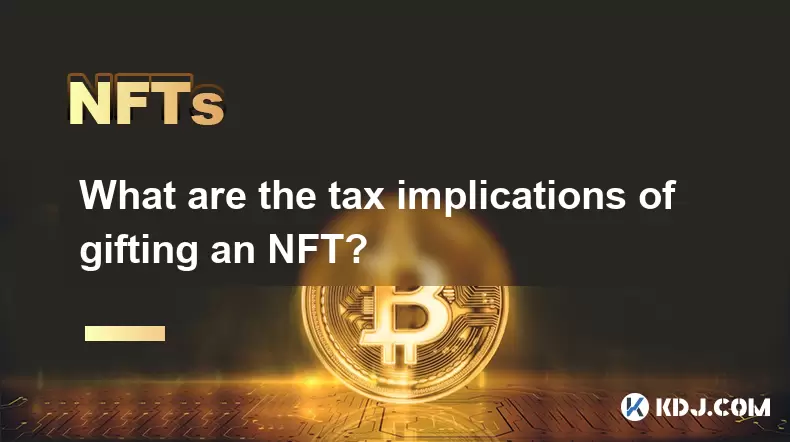
What are the tax implications of gifting an NFT?
Jul 19,2025 at 04:21am
Understanding the Basics of NFT GiftingGifting a Non-Fungible Token (NFT) involves transferring ownership from one individual to another without recei...
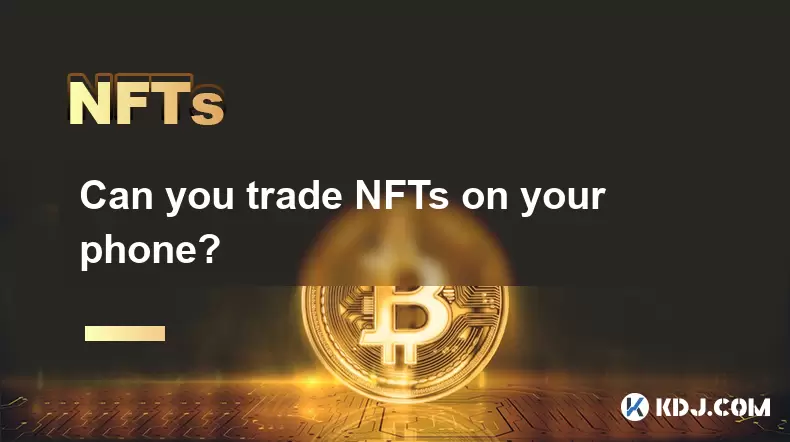
Can you trade NFTs on your phone?
Jul 18,2025 at 04:29am
Trading NFTs on Mobile DevicesYes, you can trade NFTs on your phone, and the process has become increasingly streamlined thanks to a variety of mobile...
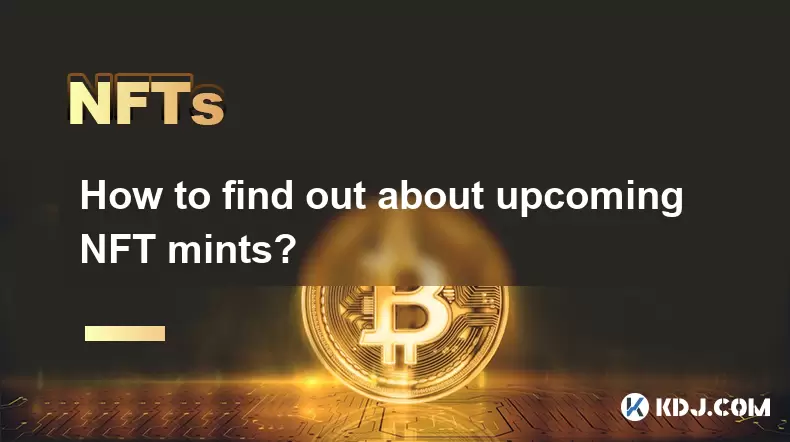
How to find out about upcoming NFT mints?
Jul 18,2025 at 11:50am
Exploring NFT Minting OpportunitiesUnderstanding the landscape of upcoming NFT mints is crucial for collectors, investors, and creators who wish to st...
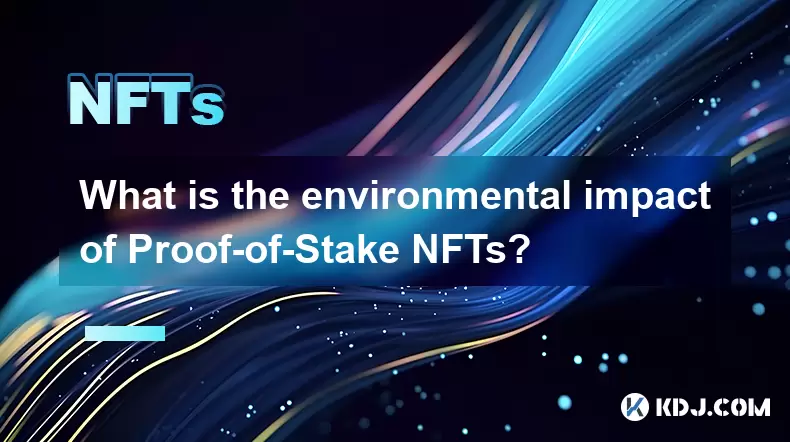
What is the environmental impact of Proof-of-Stake NFTs?
Jul 17,2025 at 07:14pm
Understanding the Basics of Proof-of-Stake NFTsProof-of-Stake (PoS) is a consensus mechanism used by blockchain networks to validate transactions and ...
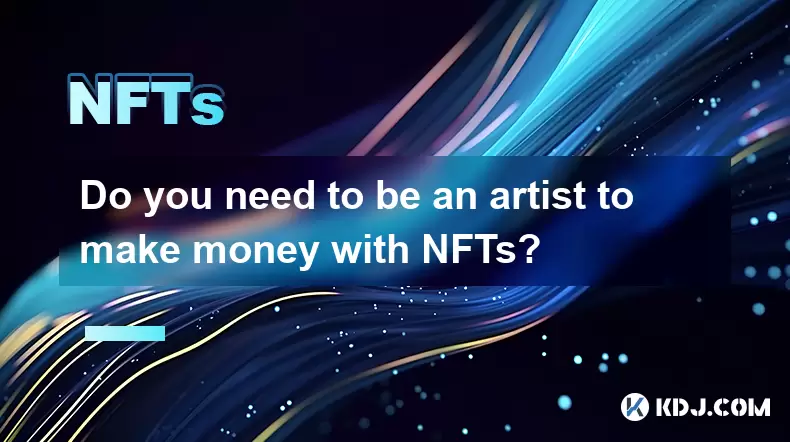
Do you need to be an artist to make money with NFTs?
Jul 19,2025 at 06:35am
Understanding the Role of Art in NFTsThe non-fungible token (NFT) market has grown rapidly, offering various opportunities for creators and investors....
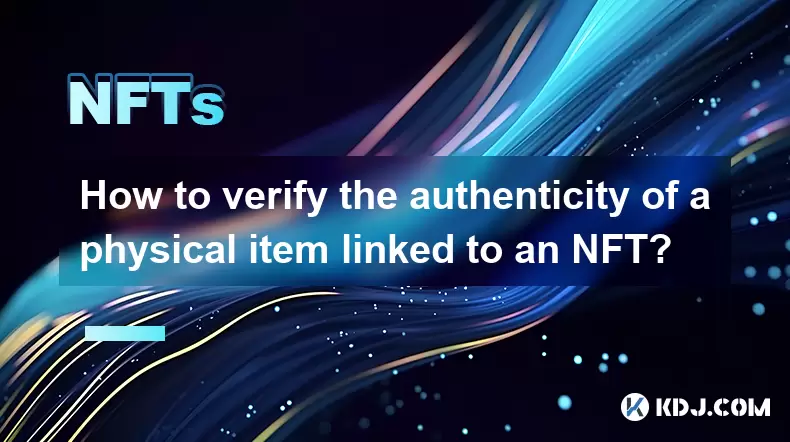
How to verify the authenticity of a physical item linked to an NFT?
Jul 18,2025 at 03:07pm
Understanding the Link Between NFTs and Physical ItemsWhen an NFT is linked to a physical item, it essentially acts as a digital certificate of owners...

What are the tax implications of gifting an NFT?
Jul 19,2025 at 04:21am
Understanding the Basics of NFT GiftingGifting a Non-Fungible Token (NFT) involves transferring ownership from one individual to another without recei...

Can you trade NFTs on your phone?
Jul 18,2025 at 04:29am
Trading NFTs on Mobile DevicesYes, you can trade NFTs on your phone, and the process has become increasingly streamlined thanks to a variety of mobile...

How to find out about upcoming NFT mints?
Jul 18,2025 at 11:50am
Exploring NFT Minting OpportunitiesUnderstanding the landscape of upcoming NFT mints is crucial for collectors, investors, and creators who wish to st...

What is the environmental impact of Proof-of-Stake NFTs?
Jul 17,2025 at 07:14pm
Understanding the Basics of Proof-of-Stake NFTsProof-of-Stake (PoS) is a consensus mechanism used by blockchain networks to validate transactions and ...

Do you need to be an artist to make money with NFTs?
Jul 19,2025 at 06:35am
Understanding the Role of Art in NFTsThe non-fungible token (NFT) market has grown rapidly, offering various opportunities for creators and investors....

How to verify the authenticity of a physical item linked to an NFT?
Jul 18,2025 at 03:07pm
Understanding the Link Between NFTs and Physical ItemsWhen an NFT is linked to a physical item, it essentially acts as a digital certificate of owners...
See all articles





















